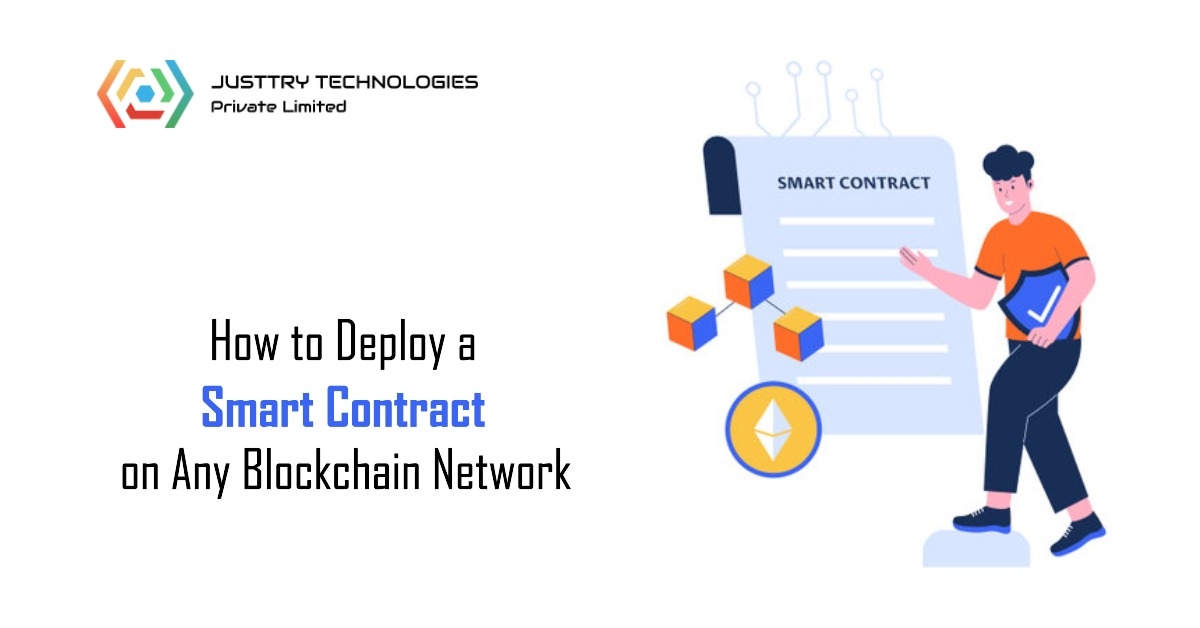How to Deploy a Smart Contract on Any Blockchain Network

Introduction
In an era shaped by trustless systems and decentralized logic, smart contracts stand as the pillars of blockchain automation. These self-executing code snippets have evolved from rudimentary scripts into powerful tools governing billions in digital value. As industries migrate toward decentralization, the ability to deploy blockchain-based smart contracts becomes an indispensable technical asset.
What are Smart Contracts
Smart contracts are programmable agreements that automatically execute predefined actions when certain conditions are met. Unlike traditional contracts, they don't rely on intermediaries. Once deployed, they are immutable, transparent, and verifiable by anyone on the blockchain. This deterministic nature ensures trust, enabling a wide range of applications from financial services to supply chain automation.
In blockchain ecosystems, Web3 smart contracts function as the application layer. They govern token standards, facilitate decentralized exchanges, and manage complex decentralized autonomous organizations (DAOs).
Why Deploy a Smart Contract
Deploying a smart contract enables secure, automated, and transparent transactions without intermediaries. It ensures trust, reduces costs, and executes tasks instantly when conditions are met.
Ideal for DeFi smart contracts, NFTs, and Web3 apps, smart contracts power decentralized solutions with global reach and reliability. They are the foundation of blockchain-based innovation in today’s digital economy.
Choosing the Right Blockchain Platform
Each blockchain network brings its protocols, virtual machines, and consensus mechanisms. Selecting the right platform is crucial for scalability, cost-efficiency, and functionality.
-
Ethereum: The pioneer and most robust ecosystem for smart contracts; high gas fees remain a concern.
-
BNB Chain: Offers compatibility with Ethereum’s tooling and lower transaction costs.
-
Polygon: A Layer 2 solution known for fast and economical deployments.
-
Solana: Ideal for high-performance applications, though less beginner-friendly due to its Rust-based development.
Factors to consider:
-
Community support
-
Gas fee structures
-
Throughput and finality time
-
Interoperability with other protocols
Setting Up Your Development Environment
To begin smart contract development, a comprehensive setup is essential:
-
IDE: Use platforms like Remix (web-based) or Visual Studio Code for structured development.
-
Node installation: Tools such as Ganache simulate a personal blockchain for testing.
-
Wallet: MetaMask or hardware wallets for signing transactions.
-
SDKs: Truffle and Hardhat are preferred frameworks for streamlined development and testing.
Proper configuration ensures faster iterations and a secure build process.
Writing the Smart Contract Code
The code behind smart contracts must be both functional and secure.
-
Solidity: The go-to language for Ethereum and compatible chains; offers object-oriented features.
-
Rust: Used for Solana; known for memory safety and performance.
-
Vyper: A more secure and minimalist alternative to Solidity.
Best practices:
-
Modularize contract functions
-
Use version control
-
Include fallback mechanisms for critical operations.
-
Avoid hardcoded addresses and values.
Well-written code reduces vulnerabilities and facilitates smoother audits.
Testing the Smart Contract
Before going live, rigorous testing is vital.
-
Local Testing: Use Truffle or Hardhat to simulate deployments.
-
Unit Testing: Verify each function under different scenarios.
-
Testnet Deployment: Deploy contracts on public testnets like Goerli, Sepolia, or Mumbai to observe real-time behavior without risking funds.
These stages help detect logic errors, misconfigured functions, and compatibility issues.
Deployment on the Blockchain
With tests completed, you're ready to deploy.
Deployment Steps:
-
Connect your wallet to the selected blockchain
-
Fund your wallet with the native currency to pay for gas.
-
Compile the contract
-
Use CLI tools like truffle migrate or Hardhat’s deploy script.
-
Confirm the transaction on your wallet interface.
Gas fees fluctuate; use gas estimators or set manual limits to avoid failed deployments.
Verifying and Interacting with the Deployed Contract
After deployment, verification provides public transparency.
-
Block Explorers: Platforms like Etherscan or BscScan allow source code verification.
-
Contract ABI: Use the ABI (Application Binary Interface) to interact with the contract via tools like Remix or a web3 interface.
For web integrations:
-
Use Web3.js or Ethers.js to build a UI that communicates with the contract.
-
Ensure proper wallet connection and transaction confirmation prompts for users.
Security and Auditing Measures
Security isn't an afterthought; it’s the backbone of trustless systems.
Common pitfalls:
-
Reentrancy attacks
-
Integer overflows
-
Unchecked external calls
Security steps:
-
Run automated tools like MythX or Slither
-
Conduct peer reviews
-
Schedule third-party audits before mainnet deployment.
A secure smart contract is not just functional, it’s future-proof.
Why Our Professional Services
Sometimes, it's wise to bring in the experts.
Engaging smart contract development services ensures architectural precision and code-level integrity. Especially for enterprises and high-value projects, collaborating with a smart contract development company like Our Justtry Technologies provides:
-
Custom-built, audited contracts
-
Ongoing support and versioning
-
Integration with backend and frontend systems
The benefits extend beyond code; they offer peace of mind.
Conclusion
Deploying a smart contract on any blockchain network requires technical fluency, strategic choices, and a meticulous approach to testing and security. As decentralized technologies reshape the digital economy, businesses must decide: will they adapt and build on the trustless future, or be left behind?
Which blockchain will host your next transformative idea?
- Questions and Answers
- Opinion
- Motivational and Inspiring Story
- Technology
- True & Inspiring Quotes
- Live and Let live
- Focus
- Geopolitics
- Military-Arms/Equipment
- Sicurezza
- Economy/Economic
- Art
- Causes
- Crafts
- Dance
- Drinks
- Film/Movie
- Fitness
- Food
- Giochi
- Gardening
- Health
- Home
- Literature
- Music
- Networking
- Altre informazioni
- Party
- Religion
- Shopping
- Sports
- Theater
- Health and Wellness
- News
- Culture

